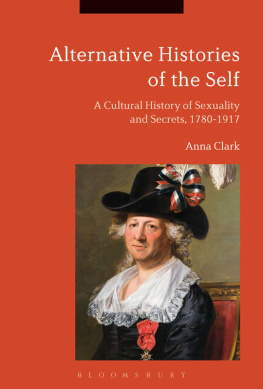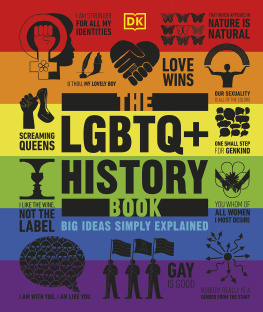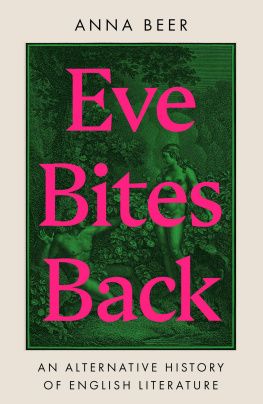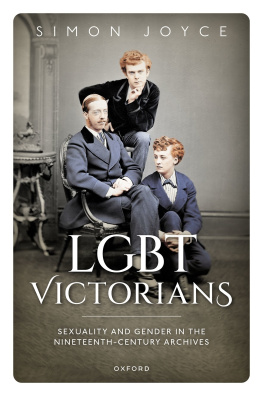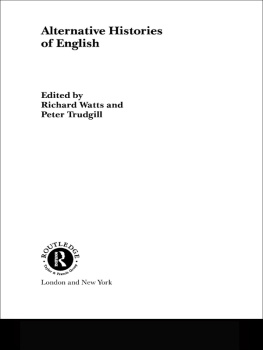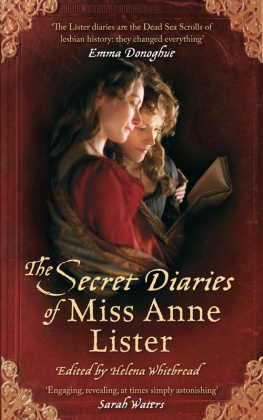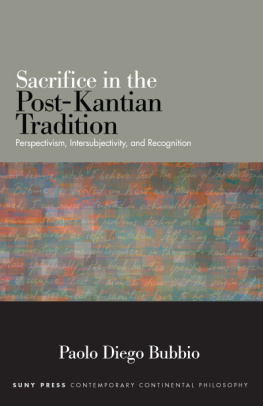Alternative Histories of the Self
Alternative Histories of the Self
A Cultural History of Sexuality and Secrets, 17621917
Anna Clark
Bloomsbury Academic
An imprint of Bloomsbury Publishing Plc

To my sisters, Hilary Clark and Emily Victorson
Four of the chapters in this book were published, in different forms, in other publications. The author and publisher would like to thank the editors and publishers of these journals (and book) for their permission to use this material.
The Chevalier dEon, Rousseau, and New Ideas of Gender, Sex and the Self in the late Eighteenth Century, in The Chevalier dEon and His Worlds: Gender, Espionage and Politics in the Eighteenth Century, ed. Simon Burrows, Jonathan Conlin, Valerie Maine, and Russell Goulbourne (Continuum, 2010).
Wilkes and dEon: The Politics of Masculinity, 17631778, Eighteenth-Century Studie 32, no. 1 (1998): 1948.
Anne Listers Construction of Lesbian Identity, Journal of the History of Sexuality 7, no. 1 (July 1996): 2350.
Anna Clark and Aaron Windel, The Early Roots of Liberal Imperialism: The Science of a Legislator in Eighteenth-Century India, Journal of Colonialism and Colonial History 14, no. 2 (2013).
James Hinton and Victorian Individuality: Polygamy and the Sacrifice of the Sel, Victorian Studies 54, no. 1 (Autumn 2011): 3561.
Rhodri Mogford and Beatriz Lopez of Bloomsbury have shepherded this book expeditiously through the publication process. I am very grateful to the University of North Carolina at Charlotte Foundation for funding research on dEon and Lister and to the Imagine Fund and the Samuel Russell Chair of the University of Minnesota for funding the studies of Richard Johnson, James Hinton, and Edith Ellis.
Ted Koditschek and Marilyn Morris were wonderful readers who greatly improved the final product. Teds comments were especially valuable for the introduction, which was also greatly improved by the suggestions of M. J. Maynes, Anne Carter, Andy Elfenbein, Kirsten Fischer, and Kate Solomonson. Seth Koven invited me to the Rutgers Center for Historical Analysis seminar on Ethical Subjects, which gave me a useful frame to start thinking about these issues, and his comments and those of the audience, especially Judith Surkis, Alastair Bellany, and Bonnie Smith, were most fruitful.
In its earlier incarnations, the chapter on the Chevalir/e dEon was generously helped by Gary Kates and Simon Burrows, and the conference on dEon in Leeds, resulting in the edited collection The Chevalier dEon and His Worlds (2010) gave me many new insights, especially the work on Marilyn Morris on the Chevalir/e in the context of transgender narratives.
The chapter on Anne Lister was illuminated by the comments of Anne Carter, Stephanie Sieburth, and Karen Haltunen, as well as the popular and academic audiences who heard the original paper and responded to the article over many years, most notably Laura Doan.
Aaron Windel cowrote the original article on Richard Johnson that had a somewhat different focus; he contributed great insights and research; Justin Biel also helped with the research and insights from his own work on Richard Johnson and religious toleration in eighteenth-century India and Ireland. Both Justin and Aaron also made helpful comments on the new chapter on Johnson. The original article was aided by comments from J. B. Shank, David Harris Sacks, the anonymous reviewers for JCCH, members of the Theorizing Early Modern Studies workshop at University of Minnesota, participants at the Economies of Empire conference at the Nicholson Center for British Studies, University of Chicago, and audiences at the North American Conference on British Studies.
For Hinton, Anne Summers guided me to the Hinton papers in the Havelock Ellis collection at the British Library, and Seth Koven shared his insights into Hinton over the years and provided astute comments on the original article. Garrett Karrberg provided helpful research assistance. I would also like to thank audiences at the Nineteenth Century Studies group at the University of Minnesota, the North American Conference on British Studies and the American Historical Association. Gordon Hirsch, Andy Elfenbein, Lara Kriegel, Andrew Miller, and an anonymous reader helped shape the version in Victorian Studies.
The chapter on Edith Ellis was greatly improved by the comments of Edith Ellis, Alison Oram, Laura Doan, Lucy Delap, and Ivan Crozier, who all contributed their own expertise. I first presented this paper to Workshop on the History of Women, Gender and Sexuality at the University of Minnesota, where the audience, and especially Elizabeth Williams and M. J. Maynes made useful comments. I would also like to thank Deborah Cohen for inviting me to present on Edith Ellis at the British history seminar at the Newberry Library, Chicago, and Deborah and the audience for feedback.
Above all, I owe a deep debt of gratitude to my wife, Anne Carter, who not only keeps me happy, but who greatly improves my writing. I have dedicated this book to my sisters, who have transformed themselves in amazing ways.
I know my heart, and have studied mankind; I am not made like any one I have been acquainted with, perhaps like no one in existence; if not better, I at least claim originality, and whether Nature did wisely in breaking the mold with which she formed me, can only be determined after having read this work.
Rousseau, Confessions, p. 1
In his bestselling Confessions, the eighteenth-century philosopher Jean-Jacques Rousseau shocked and fascinated his readers by revealing not only his great thoughts but also his failed love affairs, emotional instability, and ethical lapses. He justified his defiance of conventional religious morality by declaring that he was a unique subject unlike other men; his inborn nature thus explained his flaws and his genius.
This proclamation inspired the Chevalir/e dEon, a French diplomat, in moments of self-transformation. On crashing his career, he cited Rousseau to complain that the artifice of the court suppressed the virile courage of natural man. On becoming a woman, Rousseau inspired her to reveal what she saw as her true, natural self. Anne Lister, a wealthy Yorkshire gentlewoman, also quoted Rousseau in her coded diaries to support her sense of herself as unique and unlike others. From a young age, she fell in love with women, who reciprocated her feelings and whom she seduced; she told them that her feelings were natural, and therefore justified.
This book draws on five case studies, beginning with dEon and Lister, to examine how my subjects usedor rejectedthe notion of the unique self. My method is different from the usual histories that analyze how great philosophers thought about the self.
Some have argued that this very notion of the unique, inborn self was linked with increasingly rigid assumptions about the naturalness of gender relations, and categories of sexual identity. Indeed, Rousseau was highly problematic for dEon and Lister, because he thought that only men could be unique individuals. Instead of expressing themselves and exploring their unconventional thoughts, he argued, women should be delicate girls and tender mothers. Neither dEon nor Lister could fit Rousseaus feminine ideal; dEon fought with swords and Lister liked to shoot pistols. How could they be inspired by Rousseau when he repudiated learned ladies and masculine women? To answer this question, I will look at how dEon, Lister, and three other unusual individuals engaged in what might be called a queer method of reading: they drew on seemingly inhospitable discourses and exploited their paradoxes to create their own sense of self.
Next page
